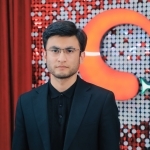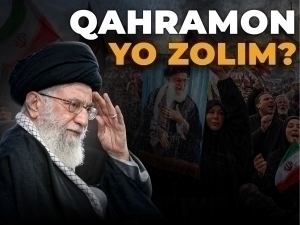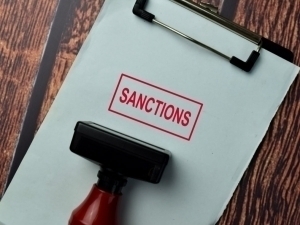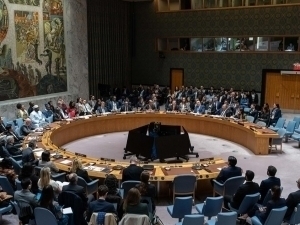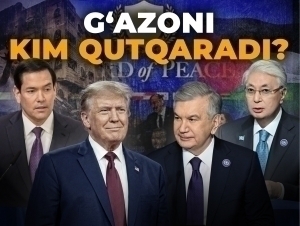London Summit: European leaders back Zelensky amid tensions with Washington
Review
−
03 March 2025 6126 7 minutes
On March 2, European leaders organized a summit in London to show their support for Ukrainian President Vladimir Zelensky. The primary goal of the summit was to agree on measures to ensure peace in Ukraine and stability across the continent. British Prime Minister Keir Starmer, who hosted the summit, emphasized that the plan's success depends heavily on the support of the United States.
Let's take a step back to review the sequence of events. The summit occurred just two days after a catastrophic bilateral meeting in the Oval Office. During that meeting, a heated argument between Trump and Zelensky led American officials to reportedly "show the Ukrainians the exit." For some, this incident highlighted Trump's rapprochement with Putin, while others saw it as a testament to the US President's firm stance on Ukraine's mineral resources. In an interview with Fox News after the meeting, Zelensky expressed gratitude to Trump and the American people but stopped short of apologizing, which strained relations. Following the meeting, there were reports that the US had halted funding for Ukraine's energy system, and the issue of military aid was also in question. Some sources even claimed that the Ukrainian delegation had to pay for their trip to the US out of their own pockets for the first time in years.
Zelensky wasted no time and left Washington for London, where he met with Prime Minister Keir Starmer on March 1. According to a Bloomberg source, after meeting with Zelensky, Starmer called Trump and French President Emmanuel Macron. While the details of their conversations were not disclosed, the source described them as constructive. Macron, in turn, spoke with both Zelensky and Trump on March 1, urging them to remain calm after the White House incident. Macron noted that Zelensky expressed his readiness to resume dialogue with Washington, including a deal that would allow the US to benefit from Ukraine's natural resources. Zelensky himself reiterated on social media that he is still willing to sign a contract with the US regarding mineral resources, despite the recent events at the White House. However, he also stressed the importance of obtaining security guarantees for Kyiv.
The Trump administration, on the other hand, wants Zelensky to openly apologize for the incident at the White House if Kyiv wishes to restore relations with the US. For instance, US Secretary of State Marco Rubio, who maintained diplomatic decorum during most of the meeting, demanded an apology from Zelensky. Bloomberg sources confirmed that the White House is waiting for exactly that. NATO Secretary-General Mark Rutte also believes that an apology would be the right decision, telling Zelensky during a phone conversation that Trump's efforts for Ukraine should be respected and that the Ukrainian President should find a way to improve relations with the US.
The Second Summit Triggered by Trump
In less than two months since Trump took office, European leaders have organized two summits in response to his administration's actions. The first was an extraordinary summit in Paris initiated by Macron after US Vice President James David Vance's speech at the Munich Conference. The second summit was held in London on March 2, following the historic clash at the White House. During the London summit, European leaders welcomed Zelensky and pledged their support. The summit, titled "Ensuring Our Future," took place at Lancaster House in central London and included leaders from Ukraine, France, Germany, Denmark, Italy, the Netherlands, Norway, Poland, Spain, Canada, Finland, Sweden, the Czech Republic, and Romania, as well as Turkish Foreign Minister Hakan Fidan. European Commission President Ursula von der Leyen, European Council President Antonio Costa, and NATO Secretary-General Mark Rutte were also present.
Before the summit began, hundreds of demonstrators gathered outside the British Prime Minister's residence at 10 Downing Street to show their support for Ukraine and opposition to Russian President Vladimir Putin. They also sang the Ukrainian national anthem.
During the post-summit press conference, Starmer pledged that the UK, Ukraine, and France would form a "coalition of volunteers" to develop a peace plan to present to the US administration.
"We stand at a crossroads in history today. Now is not the time for more talk—it is time to act and unite around a new plan for a just and lasting peace," said the Prime Minister.
While Starmer did not name the other countries in the coalition, he emphasized that each nation must take responsibility and contribute as much as possible. He also announced that the UK would provide Ukraine with £1.6 billion from frozen Russian assets to purchase over 5,000 air defense missiles. He acknowledged the difficulty of reaching consensus on increasing defense spending across Europe. According to NATO Secretary-General Mark Rutte, some European leaders mentioned new plans for defense spending at the meeting but declined to provide details.
Starmer added that the European leaders agreed to maintain military aid to Kyiv and increase economic pressure on Moscow. They also emphasized that Ukraine should be involved in any peace negotiations. Starmer's comments appeared to reference the US-Russia negotiations in Riyadh and Trump's statement that Zelensky's participation in peace talks was insignificant. Regardless, Starmer's initial plans to support Ukraine were partially revealed as he spoke about the "coalition of volunteers." He reiterated the UK's readiness to "put boots on the ground and planes in the air" to defend Ukraine and called on other coalition members to do the same if necessary.
European Commission Chief Issues Stern Warning: Strengthen Ukraine's Stability
European Commission President Ursula von der Leyen, speaking after the London summit, emphasized that Europe must bring Ukraine to a state of economic, energy, and military stability. She stressed the importance of providing Ukraine with security guarantees to transform the war-torn country into a "steel fortress" that potential aggressors like Russia cannot penetrate. Von der Leyen also highlighted the urgent need for the European Union to rearm and increase defense spending to align with the new geopolitical realities.
"We must truly take steps and prepare for 'the worst,'" von der Leyen said.
Von der Leyen added that on March 6, during an emergency summit in Brussels, she will present EU leaders with a comprehensive defense plan.
Ukrainian President Vladimir Zelensky, meanwhile, stated that he discussed "security guarantees and conditions for a just peace" for Ukraine with his European counterparts at the summit.
"We are preparing a series of important meetings and decisions soon. We are all working together to create a reliable foundation for cooperating with America on the path to true peace and guaranteed security in Europe," the Ukrainian leader said.
According to Zelensky, European unity is currently at a very high level, a phenomenon not seen for a long time.
However, there are significant doubts about the unity of the European countries. The possibility of the EU acting in unison on critical issues, particularly regarding Ukraine, has recently seemed unlikely. For example, during the London summit mentioned earlier, Polish Prime Minister Donald Tusk claimed that the summit participants did not discuss security guarantees for Ukraine in their deliberations. The Prime Minister also mentioned a "sense of disorder" and a lack of a plan among the European Union leaders. This contradicts the statements and details provided by other leaders who attended the summit.
Additionally, the Baltic states were not invited to the summit. While they did not openly criticize this decision, a Lithuanian presidential advisor told the Associated Press that they were displeased with not being invited.
